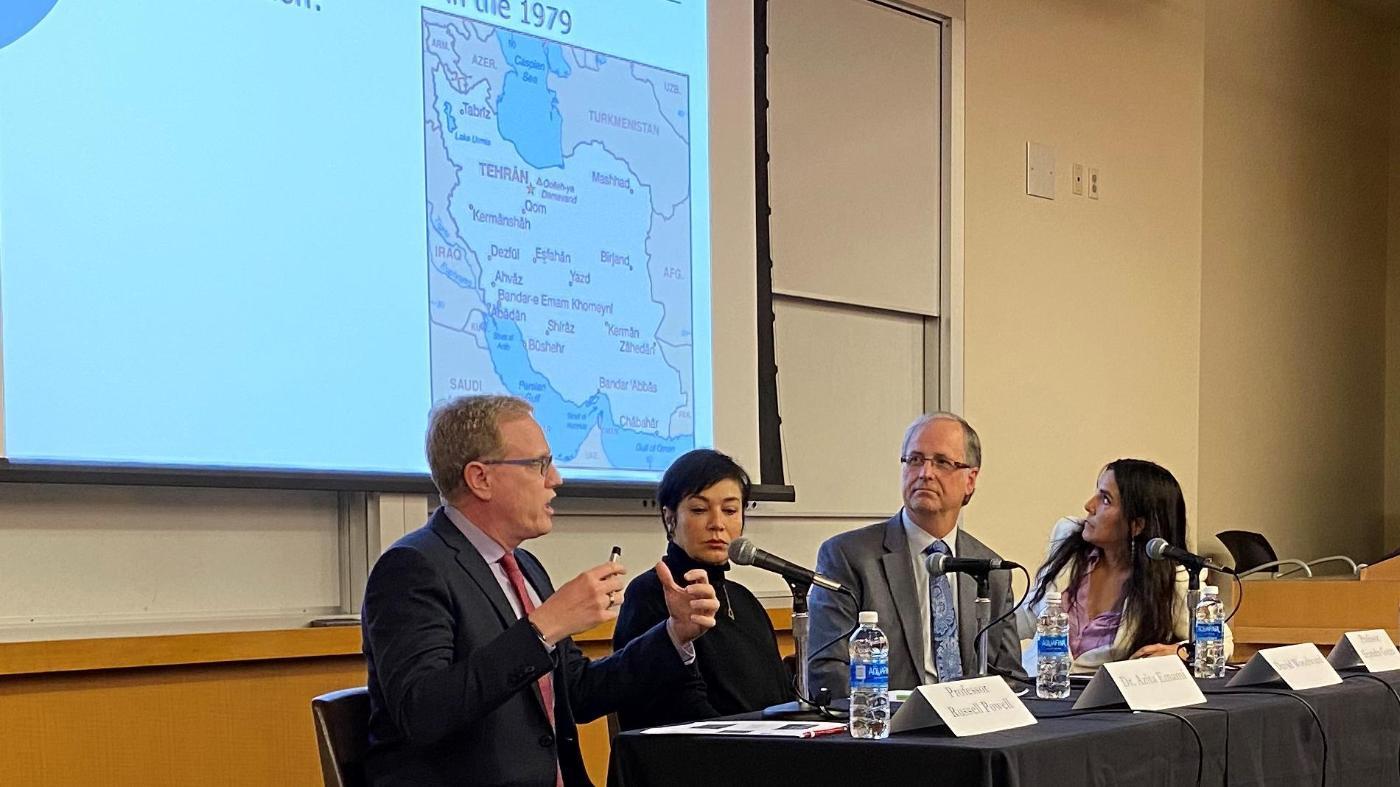In a show of solidarity with human rights protesters in Iran, Seattle University School of Law students issued a statement condemning gender policing and discrimination by the governing Islamic regime and are working to educate the law school community about the country’s laws and history.
“The ground of Iran is full of blood, but we must not let the Iranians also drown in silence,” wrote students in Professor Ron Slye’s Human Rights Clinic. (See: Human Rights Clinic statement on Iran.)
The massive protests were sparked by the death of Mahsa Amini, who died after being arrested by the government’s “morality police” in September for allegedly wearing her head scarf in a way that violated government standards.
“Hundreds of Iranians have been killed and thousands have been imprisoned since the death of Mahsa Amini. The Iranian government is prosecuting, torturing, raping, and murdering women for challenging gender norms and fighting for fundamental freedoms, including choice of dress and bodily autonomy,” the clinic students wrote.
Third-year law student Doreen Fadaeiforghan was born and raised in Iran and moved to the United States in 2011. When the Islamic Republic disabled Internet access during the protests, she could not contact her family for days.
“I know for a fact that no matter where you are born, a part of your heart will always beat for Iran if raised in a Persian household,” Fadaeiforghan said.
Working with other Persian students and the Student Bar Association, she organized an educational panel discussion in early November about the crisis in Iran. The goal of the event was to raise awareness of the crisis, to differentiate the people of Iran from the Islamic Republic government, to discuss the country’s judicial system, and to provide history and context about women’s rights in the country.
The panel was made possible by the dedicated student advocacy and support from the Women of Color Coalition, the International Law Society, and the Middle Eastern and South Asian Law Association, in connection with the Student Bar Association and the Access to Justice Institute.
Panelists included:
- John Ghazvinian, executive director of the Middle East Center at the University of Pennsylvania, who joined via Zoom
- Professor Alejandra Gonza, executive director and president of Global Rights Advocacy
- David Woodward, senior advisor for global engagement at Seattle University, who grew up in Iran until age 11
- Professor Russell Powell, an expert in comparative religious jurisprudence
- Dr. Azita Emami, who was born in Iran and now serves as executive dean of the University of Washington School of Nursing
The Zoom recording of the panel discussion is available on YouTube.
Powell, who teaches law and religion at Seattle U Law, offered an overview of the turbulent political history of Iran, including the Islamic Revolution of 1979. The constitution created after that revolution combined elements of democracy, secular law, and Islamic law. For example, there are democratic elections, but all candidates must be approved by a group of religious leaders.
“One of the problems that opposition movements, like the current one, face is that these structures are extremely difficult to challenge institutionally,” he said. “That’s why, in the last 50 years, there hasn’t been an effective opposition movement.”
Ghazvinian, a historian of Iran-U.S. relations, said the current uprising reflects an ironic milestone in the Islamic Republic’s wish to be independent of U.S. influence.
“People no longer blame the United States for their problems,” he said. “They are able to see that their own government is responsible for their problems.”
“My solidarity and fellowship is with our community members affected by the events in Iran,” said Dean Anthony E. Varona. “We are proud that there are many Iranians in our Seattle U Law and SU communities. They are our schoolmates, professors, students, and faculty and staff colleagues. Many of these community members are coping with the added stress and even horror of having their friends and family deeply impacted by these events and the high level of instability and uncertainty in Iran. We stand with them at this difficult time.”

